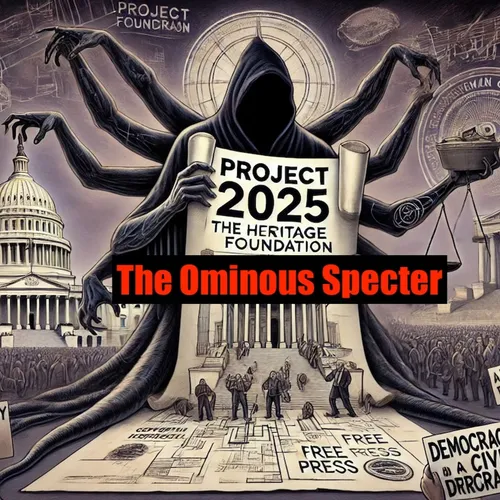Radical Overhaul: Project 2025's Blueprint for Reshaping American Governance
- Author
- Quiet.Please
- Published
- Tue 08 Apr 2025
- Episode Link
- https://www.spreaker.com/episode/radical-overhaul-project-2025-s-blueprint-for-reshaping-american-governance--65446077
As I delve into the intricacies of Project 2025, a comprehensive policy initiative spearheaded by the Heritage Foundation, it becomes clear that this is more than just a set of policy proposals – it is a radical blueprint for reshaping the very fabric of American governance.
Project 2025 is the latest in a series of "Mandate for Leadership" documents, a tradition that began with Ronald Reagan's first presidential candidacy in 1981. This 920-page manifesto is the work of over 400 conservative scholars and aims to provide a detailed policy agenda for a potential incoming Republican administration. The project's scope is vast, covering everything from education and environmental policies to media and technology regulations, and even the structure of federal agencies themselves.
One of the most striking aspects of Project 2025 is its vision for education. The initiative calls for a significant reduction in the federal government's role in education, advocating for the closure of the Department of Education and transferring its responsibilities to the states. This includes administering programs under the Individuals with Disabilities Education Act (IDEA) through the Department of Health and Human Services instead. The federal government, according to Project 2025, should be limited to a statistics-keeping role, with federal enforcement of civil rights in schools curtailed and transferred to the Department of Justice[1].
The implications are profound. For instance, Title I of the Elementary and Secondary Education Act of 1965, which provides $18 billion in federal funds for schools in low-income areas, would be allowed to expire. Public funds for education would be redirected as school vouchers, available even for private or religious schools, with no strings attached. This shift would likely exacerbate existing inequalities in education, as schools in disadvantaged areas would lose critical funding. Additionally, programs like the Head Start early education initiative, which serves over 1 million children, would be eliminated, a move criticized for lacking any evidence of the program's ineffectiveness[1][5].
Environmental policies are another area where Project 2025 proposes sweeping changes. The initiative advocates for downsizing the Environmental Protection Agency (EPA), closing its Office of Environmental Justice and External Civil Rights, and reversing the 2009 EPA finding that carbon dioxide emissions are harmful to human health. This would prevent the federal government from regulating greenhouse gas emissions, a move that aligns with the project's broader skepticism towards climate change research. The project even suggests incentives for the public to challenge climatology research, reflecting a stark divergence from the scientific consensus on climate change[1].
The project's stance on climate change is not isolated; it is part of a broader agenda to promote fossil fuels and undermine renewable energy initiatives. Project 2025 recommends preventing states from adopting stricter regulations on vehicular emissions, relaxing restrictions on oil drilling, and encouraging Arctic drilling. These proposals are at odds with the views of many Republicans who acknowledge the importance of addressing climate change, highlighting a deep internal divide within the party[1].
In the realm of media and technology, Project 2025's proposals are equally contentious. The initiative seeks to weaken the independence of public media by potentially revoking the broadcast licenses of channels critical of the administration. This could be achieved through an FCC controlled by the president, in conjunction with the DOJ and FTC, launching antitrust investigations into media companies that report negatively about the administration. This approach is seen as a threat to the First Amendment and the traditional role of the media as a check on executive power[2][4].
The...
